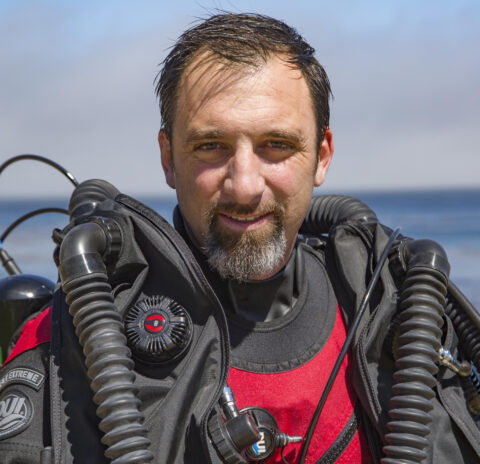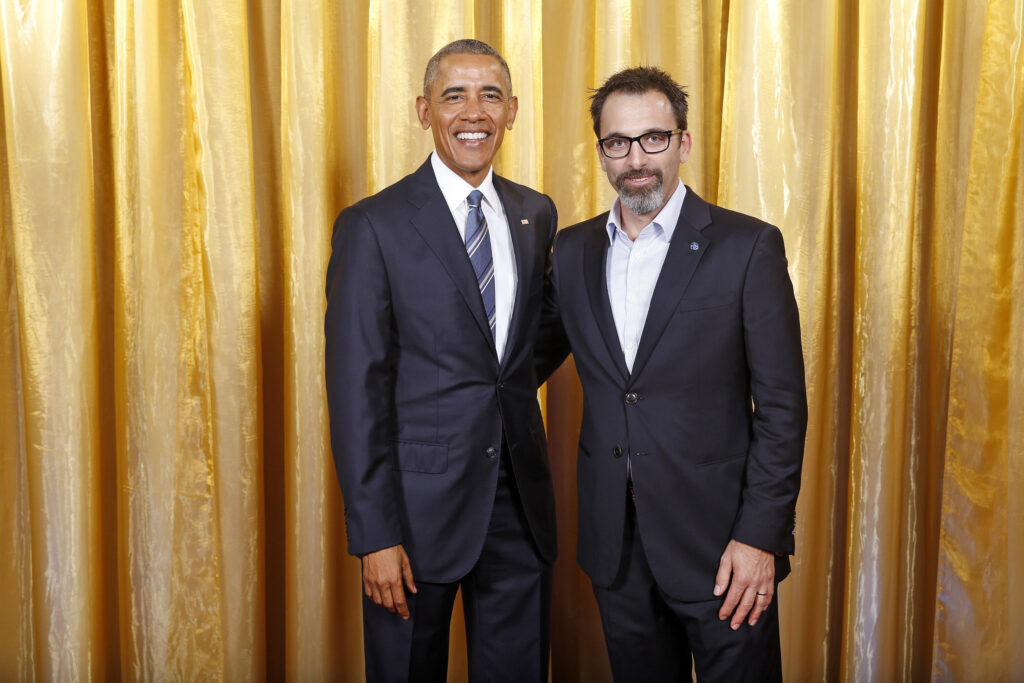Above: Conti has given a couple of TED Talks, including one on AI with nearly 7.5 million views. (Photo courtesy Maurice Conti)
The mayday call came just before midnight. A sailboat had hit a reef near Fiji, about 20 miles from Maurice Conti’s anchored catamaran, and was taking on water. Talking by radio with authorities, Conti (Stevenson ’92, Japanese history with secondary emphasis in Chinese history) and his wife, Sophie, realized that no one else could respond in time.
They set sail and found the reef at dawn. But the damaged sailboat was nowhere in sight. Finally, through binoculars, Conti spotted three distant figures clinging to a deflating life raft. The weather was too rough to sail closer, so Conti motored a dinghy through dangerous waters, rescued the sinking sailors, and got them to safety.

Conti training on a rebreather for underwater research for Autodesk’s Maritime R&D project (photo courtesy Maurice Conti)
“They probably had another 20 or 30 minutes,” he said, “and then they would have perished.”
In 2009, Conti received the Medal for Exceptional Bravery at Sea from the United Nations, the New Zealand Bravery Medal, and a U.S. Coast Guard Citation for Bravery. But this was not his first seafaring adventure. At age 5, he sailed around the world with his parents for 3 1/2 years. The lifelong love of the sea he developed on that voyage drew Conti to UCSC.
Conti grew up in El Cerrito, the only child of a “mad scientist” father and executive coach mother (two Ph.D.s each), who home schooled him until they returned from their voyage.
Starting public school as an academically advanced, world-traveled third-grader was challenging.
“I was definitely a weird kid,” Conti said. “Sometimes I had trouble adjusting to not being barefoot and being in the South Pacific. I didn’t know all the social rules and had never been teased.”
But Conti found inspiration and enjoyment watching The Undersea World of Jacques Cousteau and Star Trek, and spent many hours inventing tiny rocket-powered boats in his father’s lab, launching them in a backyard test pool (and sometimes into the air, where they exploded).
At UCSC, Conti found friendship and a core curriculum that sparked deep interest in subjects outside his major, like philosophy, astronomy, history of art and music, and a comprehensive course on AIDS at the height of the epidemic.
After graduation, Conti worked in construction to save up for traveling, moved to New York and back again, was global creative director and later head of innovation and applied research at Autodesk, sailed around the world again with his wife and young children, worked with a moonshot company in Spain, and started a consulting business.

Conti met former President Barack Obama in 2017 at the SAP CEO Summit in New York City, where they were both speakers. (Photo courtesy Maurice Conti)
As a futurist, Conti helps clients like Tesla, Nike, Mercedes AMG, and Lululemon understand what’s coming, what will matter to them, and how they can prepare for their futures. He says his work is “the intersection of really cool and really impactful, whether for the environment or for an audience or for a business,” and he’s excited about combining technology like AI and 3D printing with storytelling to foster greater societal love and care for the ocean.
He also consults through a National Academy of Sciences program that connects producers, directors, and production designers to scientists, engineers, and futurists, writing content and helping directors and producers understand how a scenario or technology might realistically look in the future.
As for his own future, Conti says we’re in a volatile and uncertain period (COVID didn’t help),
which makes it difficult to understand what’s coming our way with any clarity.
“So instead, the strategy is to build resilience and be ready for whatever may come so you can thrive in that future,” he said. “That’s not necessarily a negative thing. Rather than making big plans, it’s about being ready for anything.”

